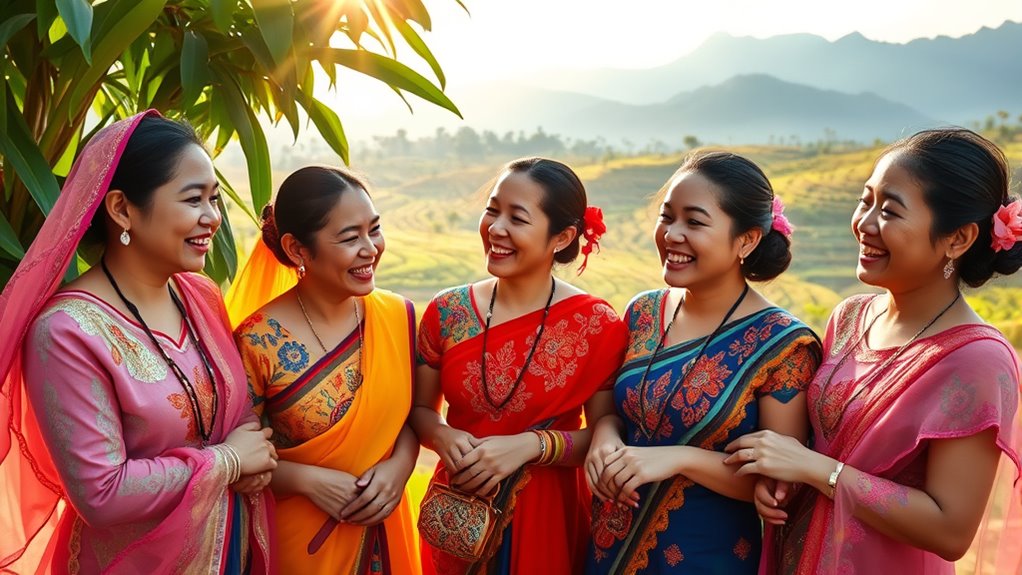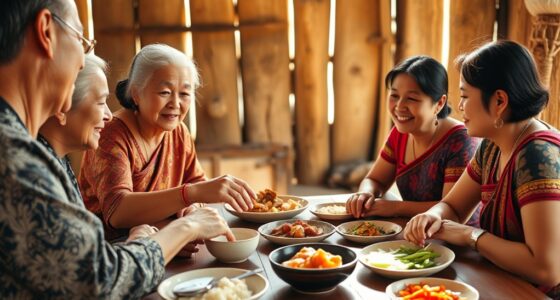Filipina women are proud of their heritage because it’s rooted in historical equality and strength. Pre-colonial society respected women’s roles in leadership, spirituality, and commerce. They’ve contributed greatly to national identity, leading movements against imperialism. Now, they carry this legacy forward, advocating for gender equality and economic empowerment. As family ties remain strong, women are redefining roles and challenging norms. There’s a wealth of inspiring stories and initiatives that showcase their resilience and drive.
Key Takeaways
- Filipina women take pride in their historical equality and leadership roles in pre-colonial society, reflecting strong cultural heritage.
- The legacy of influential women in nationalism showcases their vital contributions to Philippine history and identity.
- Economic empowerment through education and leadership roles inspires pride and resilience among Filipina women today.
- Strong family values and community ties foster a sense of identity and belonging, reinforcing cultural pride.
- Ongoing advocacy for gender equality highlights the progress made and the commitment to honoring their heritage.
Historical Equality in Pre-colonial Society
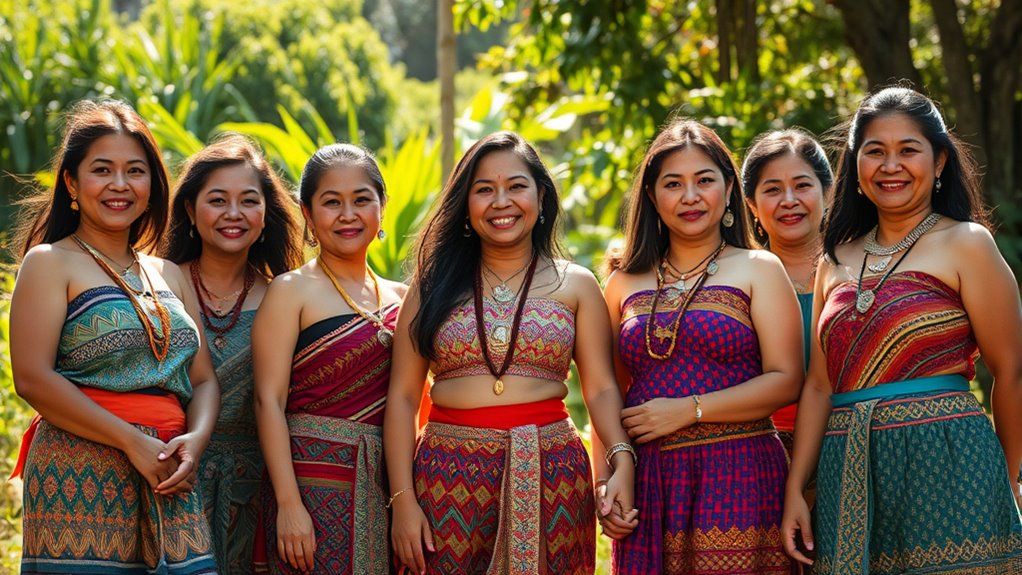
While many societies were steeped in patriarchy, pre-colonial Philippine society stood out for its historical equality between men and women.
You’d find a bilateral kinship system that granted both genders equal status, allowing women to own property and engage in trade. In fact, if a village lacked a male heir, women could become village chiefs, showcasing their leadership skills.
Women also served as high-priestesses and medicine women, integral to spiritual and community life. With access to education and advanced knowledge, women were empowered through family teachings.
Their roles extended beyond the domestic sphere, actively participating in political and economic decisions. This egalitarian structure highlighted women’s essential contributions to society, reinforcing their esteemed status.
Cultural Resilience and Family Ties
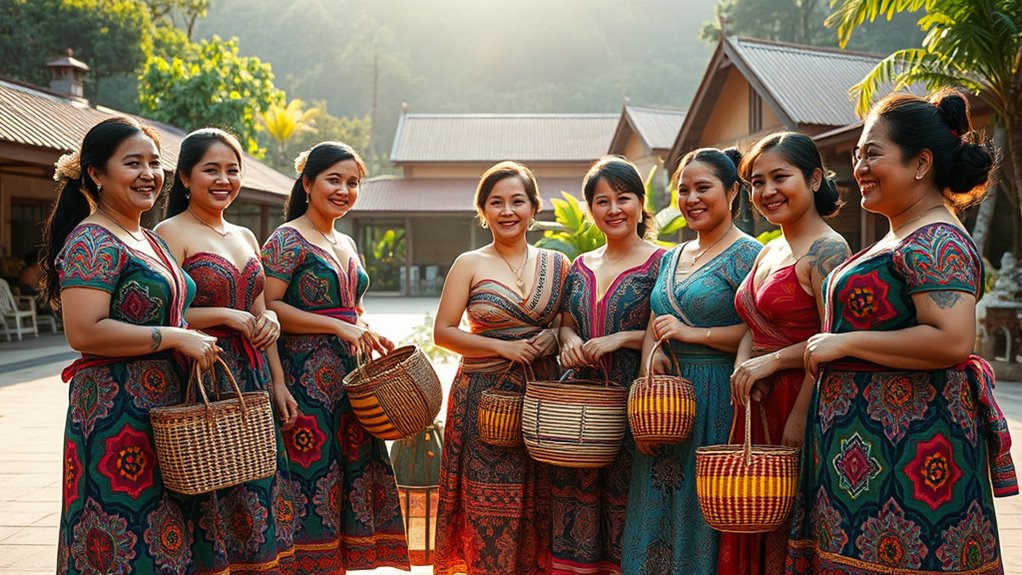
Cultural resilience among Filipina women thrives through strong family ties, which serve as an important support system in maneuvering life’s challenges.
The concept of *kapwa* fosters a shared identity, enhancing communal bonds that help you navigate difficulties. Internal dignity, or *karangalan-dangal*, drives you to uphold your cultural identity despite external pressures.
Acts of goodwill, represented by *kagandahang-loob*, promote kindness within families, creating robust support networks. Emphasizing *pakikisama* guarantees harmony and cooperation, crucial for sustaining family connections.
In facing adversities, you often prioritize collective goals, reinforcing familial resilience. As you maintain emotional ties, even from afar, the practice of *utang ng loob* encourages you to honor family obligations, guaranteeing that support flows both ways.
Empowerment Through Economic Contributions

Strong family ties not only foster cultural resilience but also pave the way for economic empowerment among Filipina women.
With more women than men completing higher education in the Philippines, you can see the potential for increased economic participation. However, deep-seated gender norms and household responsibilities still limit your access to quality jobs.
Even when women achieve advanced education, they often face wage disparities, earning about 78% of what men do. Addressing these challenges is fundamental for achieving equal pay and boosting overall economic growth.
The Evolution of Traditional Fashion

As traditional Filipino fashion evolved, it reflected the rich tapestry of the country’s history and cultural influences. Early garments like the tapis, baro, and saya showcased indigenous roots, but Spanish colonization introduced modifications that emphasized modesty.
The addition of sleeves and the pañuelo transformed these pieces into more formal attire. The Maria Clara dress emerged as a symbol of elegance, blending Filipino and Spanish styles.
The introduction of sleeves and the pañuelo redefined traditional garments, giving rise to the elegant Maria Clara dress that fuses Filipino and Spanish aesthetics.
Key garments like the Barong Tagalog and Terno highlight Filipino heritage and adaptability. Today, modern designers merge traditional elements with global trends, creating vibrant silhouettes that resonate with both locals and international audiences.
This evolution not only honors the past but also celebrates the ongoing relevance of Filipino culture in contemporary fashion.
Role Models and Modern Empowerment
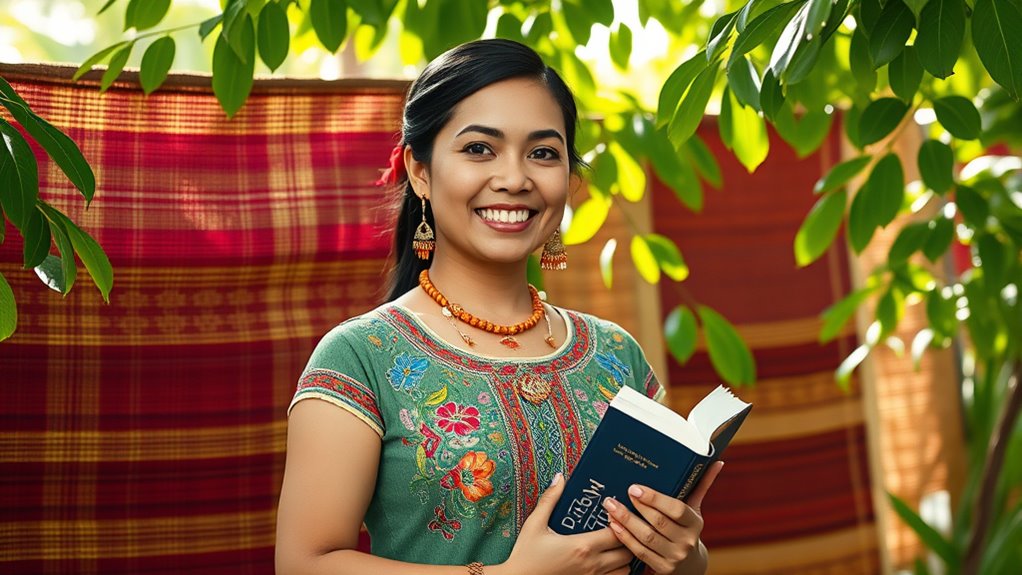
Filipina women today are redefining empowerment, building on the rich heritage shaped by their predecessors. You see strong role models like Marife Zamora and Leni Robredo breaking glass ceilings in business and politics. Their achievements inspire you to pursue your own goals, whether in sports like Hidilyn Diaz or the arts with Lea Salonga. Embracing personal development strategies can further enhance your journey as you seek to achieve your aspirations. Fathers often play a crucial role in this journey, providing unconditional support that empowers daughters to chase their dreams. Additionally, engaging with best lifestyle podcasts can provide valuable insights and motivation to fuel your ambitions. In this context, understanding the importance of emotional support can strengthen familial bonds and enhance personal growth.
Organizations like the Filipina CEO Circle support your ambitions, fostering leadership among women. As you embrace financial independence and diverse careers, you’re challenging traditional roles and prioritizing education. Awareness of these pitfalls can enhance your journey as you navigate the complexities of personal and professional growth.
While beauty standards may influence you, they don’t define your aspirations. With every innovative idea in technology or bold step in media, you contribute to a vibrant cultural landscape, empowering yourself and future generations.
Community Leadership and Social Impact
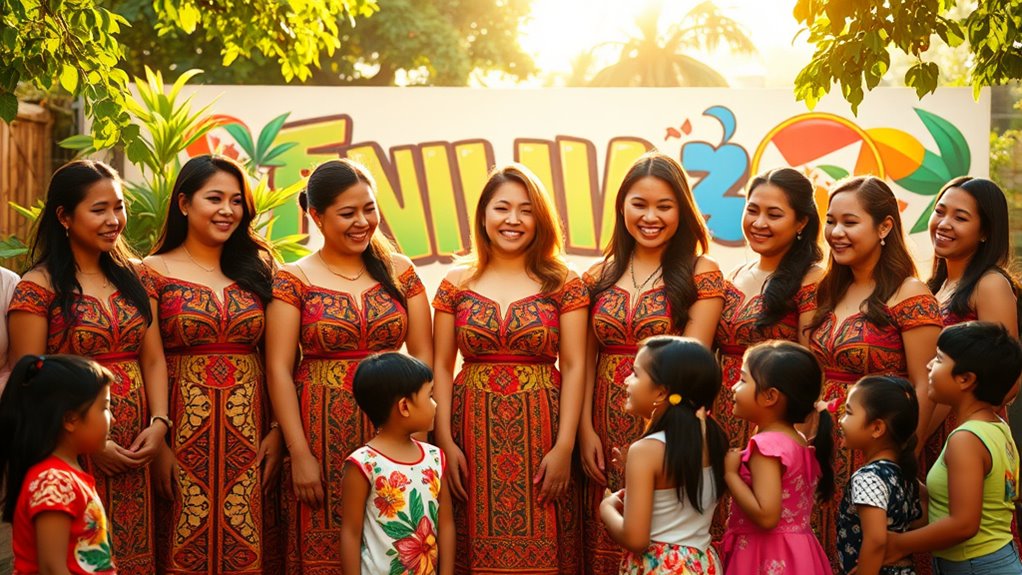
While many women are stepping into leadership roles, their impact on community and society is profound and transformative.
In the Philippines, women now represent 40% of executive leadership teams, showing significant strides toward gender equity. Their presence in operational roles is also rising, paving the way for future leaders. Furthermore, the increase in female leaders is similar to the rise in seniors texting humor, demonstrating a shift in communication and community engagement. This growing leadership among women can enhance community welfare, addressing pressing social issues effectively. Additionally, as these leaders advocate for advance directives, they can help ensure that families are prepared for critical decisions regarding health care. Regular veterinary check-ups can also be part of community health initiatives, promoting overall well-being.
Despite only 13% of CEOs being women, the increasing representation in decision-making roles correlates with better business performance and sustainability.
The rise of women in decision-making roles links directly to improved business performance and sustainability.
Furthermore, female leaders focus on community welfare, addressing crucial issues like health and education. Their initiatives often extend to family support services, which play a vital role in empowering caregivers.
With organizations promoting gender diversity, empowered women serve as role models for future generations, fostering a culture of leadership and social responsibility that strengthens communities and enhances resilience during crises.
Challenging Traditional Gender Norms
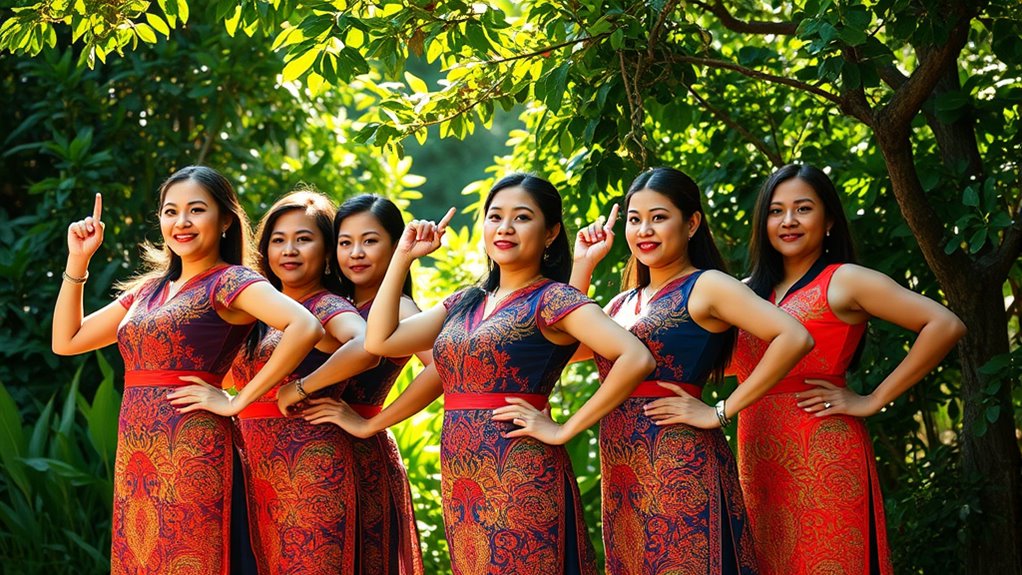
Although traditional gender norms have long defined women’s roles in the Philippines, a significant shift is underway as more women actively challenge these expectations.
You’ll notice that women are increasingly stepping into leadership positions in politics and business, a clear sign that societal views are evolving. Education plays a vital role, with women surpassing men in enrollment, breaking barriers in technology and other fields.
Meanwhile, grassroots movements like Gabriela advocate for women’s rights, pushing back against lingering biases. Men are also participating more in domestic tasks, reshaping household dynamics.
Spiritual Authority and Leadership Roles
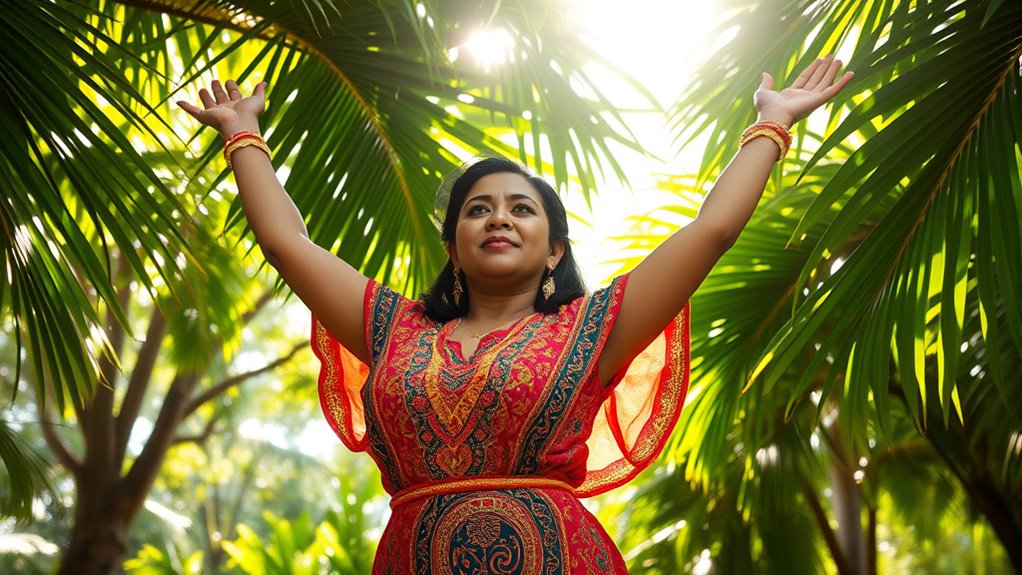
Throughout history, women in the Philippines have wielded significant spiritual authority, often taking on leadership roles that shaped their communities.
In precolonial times, priestesses known as babaylan influenced beliefs and practices, serving as mediators and spiritual guides. Their stories, like that of Caquenga, showcase how women mobilized communities and led spiritual movements.
With the arrival of Catholic missionaries, they recognized the power of these indigenous women, using their influence to spread Christianity. Women like Balinan leveraged their wealth and status to support the Church, extending their leadership beyond spirituality into social and political domains.
This legacy of women’s authority highlights the cultural significance of Filipina women, symbolizing strength and resilience throughout history.
The Role of Women in Nationalism

Women played vital roles during the Philippine Revolution, actively participating in intelligence, supply chains, and supporting combatants. Their leadership and resilience helped sustain the fight against Spanish and American imperialism, making them essential to the nationalist cause.
Unfortunately, their contributions often get overlooked in mainstream narratives, which largely focus on male figures. Yet, Filipina women symbolize strength and resistance, influencing national identity and ideals.
The intersection of nationalism and feminism empowered women historically, inspiring modern activism. Today, they’re breaking stereotypes and leading in various fields, continuing to shape the Philippines’ cultural landscape and inspiring future generations.
Their legacy in nationalism is undeniable and deserves recognition. Effective co-parenting plans can also highlight the importance of women’s roles in nurturing future generations and fostering a sense of identity.
Advocacy for Gender Equality and Rights
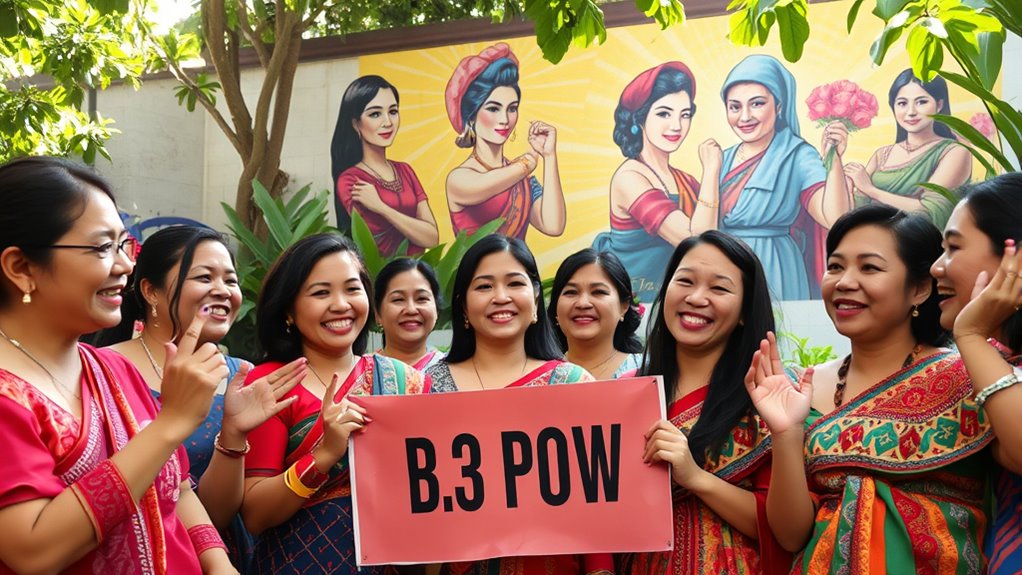
Advocacy for gender equality and women’s rights in the Philippines has made significant strides, yet challenges remain. The country ranks 25th globally in the 2024 Global Gender Gap Index and boasts progressive laws like the Declaration on the Elimination of Violence Against Women.
However, you’ll find that women are still underrepresented in leadership roles and face a 28% gender pay gap. Many work in the informal sector without social protections, and traditional norms often confine them to unpaid household responsibilities.
To combat this, strategic initiatives aim to increase women’s labor participation and dismantle gender biases. Empowering women through education and promoting their representation in decision-making are vital steps toward a more equitable future.
Frequently Asked Questions
How Do Filipina Women Celebrate Their Heritage Today?
You celebrate your heritage by embracing traditional clothing like the Maria Clara gown and participating in cultural events filled with music and dance.
You join in community activities, showcasing Filipino dishes and performing traditional dances like Tinikling.
Sharing stories and teaching younger generations about your roots strengthens your connection to your culture.
You also express your pride through modern achievements, embodying the spirit of “Pinay” and honoring the resilience of Filipina women throughout history.
What Challenges Do Filipina Women Face in Modern Society?
When it comes to the challenges Filipina women face today, they often find themselves caught between a rock and a hard place.
Despite education gains, job opportunities remain scarce due to discrimination and societal expectations. Many struggle with low wages and lack access to resources, limiting their financial independence.
Add in the threat of violence and inadequate legal protections, and it’s clear that maneuvering through modern society isn’t easy for them.
Which Historical Figures Inspire Filipina Women’s Empowerment?
When you think about historical figures inspiring Filipina women’s empowerment, Gabriela Silang’s fierce leadership against colonialism stands out.
Pura Villanueva Kalaw’s fight for women’s suffrage showcases the power of advocacy.
Melchora Aquino’s support during the Philippine Revolution highlights the importance of resilience.
Finally, Corazon Aquino’s presidency exemplifies breaking barriers in politics.
Each of these women’s legacies empowers you to embrace your strength and continue the fight for equality and representation today.
How Does Filipino Culture Influence Women’s Identities Abroad?
Filipino culture shapes your identity abroad through a rich blend of traditions and values.
You embody resilience and strength, often taking on leadership roles in your community. As you navigate new environments, you maintain strong ties to your heritage, ensuring its preservation.
The empowerment you feel stems from breaking traditional gender norms and gaining independence, while also embracing the unique blend of cultures that enriches your experience and worldview.
What Role Does Education Play in Filipina Women’s Empowerment?
You might think education’s just about hitting the books, but for Filipina women, it’s a ticket to freedom!
By gaining higher education, you open career doors and boost your earning potential. It’s like discovering a secret power that helps you break out of traditional roles and step into leadership positions.
Plus, educated women often uplift their families and communities, proving that knowledge isn’t just power; it’s a catalyst for real change!
Conclusion
In celebrating their heritage, Filipina women embody the strength of the legendary Maria Clara, who represents both grace and resilience. Their journey reflects a proud tapestry woven from historical equality, cultural richness, and a commitment to family. By challenging norms and advocating for gender equality, they’re not just honoring the past—they’re shaping the future. Like the vibrant colors of traditional attire, their contributions to society shine brightly, reminding us all that empowerment is a beautiful legacy.
